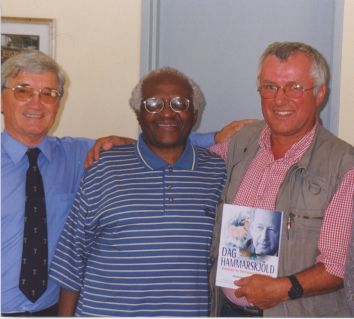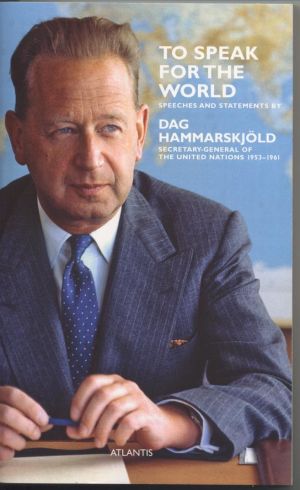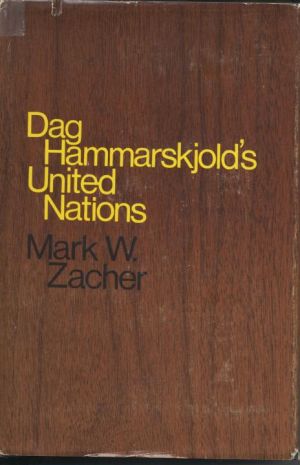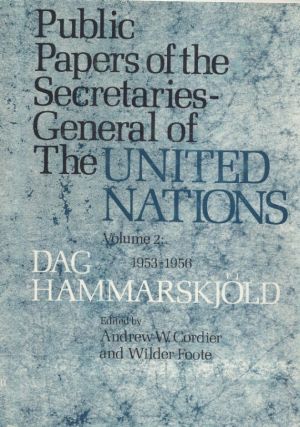
| English Biographie Bücher Freundeskreis Veranstaltungen Weltpolitik Fotos |
| Presse Tagebuch Studienreisen Reden Shop Gastbeiträge Institut Spende |
BREAKING THE DEATHLY SILENCE
On
17 September 1969 Dag Hammarskjöld died in a mysterious plane
crash near Ndola in Zambia (the northern Rhodesia). In hindsight the
Swede, born in 1905, appears to have been a beacon of light in an otherwise
murky morass of international post-war politics.
He remains so far the only person to receive the Nobel Peace Prize posthumously- as an upholder of human rights, the initiator of UN-peace troops, an advocate for the Third World during the process of de- colonisation. After the publication of his diary `Markings´, that took the world by storm, professional obituary writers had to re-assess Dag Hammarskjöld's legacy. In it Dag Hammarskjöld revealed himself to be a modern day visionary, whose holistic and progressive political vision of a new ethic for humanity formed the basis of all his actions- until he fell victim to an insidious plot designed by western secret services in cahoots with an international mining company with its headquarters in Brussels.
Stephan Mögle-Stadel began in 1994 to decipher Hammarskjöld's esoteric life-work. With the help of hitherto unpublished material and conversations with former co-workers he succeeded in unraveling the background of the plot of 1961. He also succeeded in tracing Hammarskjöld's path of inner development, relating to his public offices and activities. A still tangible reminder of these activities is the meditation room in the UN building in New York designed by him and executed by his artist friend Bo Beskow.
See also...
Former US-Ambassador to UN Cabot Lodge about Dag Hammarskjöld.
Writer Joseph Kraft's Obituary in The New York Times Magazin.
ABOUT THE AUTHOR
Stephan Mögle Stadel (1965- ) is a journalist
and publishing consultant. He studied history and psychology and furthered
his studies at the C.G. Jung-Institute for Depth psychology. He is a
member of the Erich Fromm society for Social Psychology. He also worked
for a research organisation linked to the Club of Rome from1996 to 1998.
In 1990 he was correspondent in New York and a probationer at the United
Nations in 1992. From 1993 to 1999 he was chair of the German section
of WFM-International, a pressure group a.o. for the establishing of an
International Court of Law for Crimes against Humanity (Rome-conference
1998).
Stephan has written a book a book about UN Secretary General Kofi Annan titled
UNfinished Way - the UN in the 21. Century.
REVIEWS AND COMMENTS ON THE BOOK
 " Your
book involved political as well as spiritual force."
" Your
book involved political as well as spiritual force."
DESMOND TUTU, Archbishop and bearer of the Nobel Prize for peace.
"This book is like a voyage to a sunken
continent, carrying the name Dag Hammarskjöld."
DR. THOR HEYERDAL, archaeologist and author.
"Dag Hammarskjold's stands out. He had
the power to evoke a vision. We remember him vividly because he kept
the spirit of the Charter alive in the darkest times."
BOUTROS-GHALI, former Secretary-General
source: speech on 15. Sept. 1992
Von Links nach Rechts:
Lektor Nick Lee,
sowie Friedensnobelpreisträger und
Enthüller des Attentats auf Hammarskjöld
Erzbischof Desmond Tutu mit dem
Übersetzer der englischen Ausgabe
Christoph Jensen.
"His accomplishments,
his innovations, and
his vision are a great inspiration... to uphold
the standards he put into place."
BOUTROS-GHALI, Secretary-General,
source: speach on 18. Sept. 1996
" His life and his death, his words and
his actions, have done more to shape public expectations of the office,
and indeed of the Organisation, than those of any other man or woman
in history. His wisdom and his modesty, his unimpeachable integrity and
single-minded devotion to duty, have set a standard for all servants
of the international community- and especially of course for his successors-
ethic is simply impossible to live up to. There can be no better rule
of thumb for a Secretary-General, as he approaches each new challenge
and crisis, than to ask himself, "how would Hammarskjöld have
handled this?"...
What is clear is that his core ideas remain highly relevant in this new international
context."
KOFI ANNAN - Secretary-General of the UN.
On September 6 2001 in Uppsala, Sweden ("Dag Hammarskjöld and the
21st Century")
" Dear Friend, I was very moved by the
manuscript about Dag Hammarskjöld. ...We have to overcome Nationalism
in all its forms. Nationalism is unable to solve any problems; it is
the problem- it poisons the people of the earth."
(the late) YEHUDI MENUHIN-violin virtuoso, conductor and music-teacher in letter
to the author
" There are persons in international
administration who believe the book should be impounded."
DR. ROBERT MULLER - former UN Assistant Secretary General.
" Who knows what a statesman should
look like, a statesman neither exisiting between nor within but above
the nations. We are familiar with the national statesman and also with
the cosmopolitan, but we do not know the cosmopolitician."
GÖSTA VON UEXKÜLL - Journalist and writer, published in the German
weekly newspaper DIE ZEIT, 15. November 1956.
 |
|
 |
|
 |
|